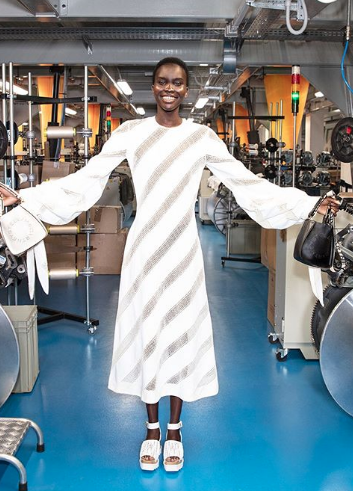GOOGLE AND WWF PIONEER GREEN FASHION PLATFORM TO REVOLUTIONISE THE INDUSTRY
Published on by Water Network Research, Official research team of The Water Network in Case Studies
Google and WWF Sweden have announced a partnership that will help brands in the fashion industry source materials in a more responsible way.
 Together, the two influential organisations will create a platform which collates data about the environmental risks and impacts of different textiles. WWF Sweden created a similar tool with flatpack furniture brand IKEA in 2018 - now their new partnership aims to use precisely this idea to revolutionise the fashion industry.
Together, the two influential organisations will create a platform which collates data about the environmental risks and impacts of different textiles. WWF Sweden created a similar tool with flatpack furniture brand IKEA in 2018 - now their new partnership aims to use precisely this idea to revolutionise the fashion industry.
WWF Sweden CEO, Håkan Wirtén, commented that collaborating with Google makes the NGO’s previous work “even more powerful”. Making the sustainability platform open-source and so available to more companies, he explained, will help with the “transformation of the whole industry”.
Much of the environmental damage of the clothes we wear is done during the earliest stages of its manufacturing. Growing and processing raw materials, like cotton, uses vast amounts of water and a lot of greenhouse gas emissions are generated before textiles become the trousers, shirts and dresses that we eventually buy.
If brands don’t make their supply chains more sustainable, a quarter of the world’s carbon budget will be used to make our clothes by 2050.
The fashion industry produces 20 per cent of wastewater and 10 per cent of carbon emissions worldwide. If brands don’t make their supply chains more sustainable, a quarter of the carbon budget to keep global warming below 1.5 degrees Celsius will be used to make our clothes by 2050.
The problem is that, currently, the early stages of manufacturing such as textile dyeing and the processing of raw materials are spread across numerous countries and so transparency is virtually non-existent. By using Google Earth’s environmental information and AI technology to process data, the tech giant hopes to fill in the gaps when it comes to sustainable sourcing.
STELLA MCCARTNEY IS ALREADY A SUSTAINABILITY PIONEER
 British fashion brand and long-term champion of sustainability, Stella McCartney, has been trialling the tool since 2019 to bring more transparency to its garment production process. It brought together data about air pollution, greenhouse gas emissions, land use and water scarcity to determine, not only the impact of different materials but also how these factors varied in the different regions where they are produced.
British fashion brand and long-term champion of sustainability, Stella McCartney, has been trialling the tool since 2019 to bring more transparency to its garment production process. It brought together data about air pollution, greenhouse gas emissions, land use and water scarcity to determine, not only the impact of different materials but also how these factors varied in the different regions where they are produced.
This initial pilot of the technology only looked at cotton and viscose because the information about their production was more widely available. Partnering with WWF will bring more data about a variety of materials, as well as countries where they are produced, to allow the expansion of the supply chain analysis tool.
“It's our ambition to create a data-enriched decision-making platform that enables analysis of the supply chain in a way that has not been possible before at this scale,” Ian Pattinson, Head of Customer Engineering for Retail at Google UK said.
“Partnering with WWF brings together Google Cloud’s technical capacity, including big-data analysis and machine learning, and WWF’s deep knowledge of assessing raw materials.”
Taxonomy
- Fibers & Textiles
- Textile
- Nanotextiles